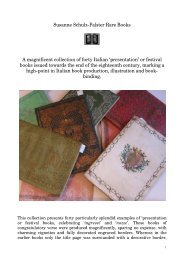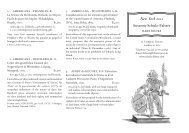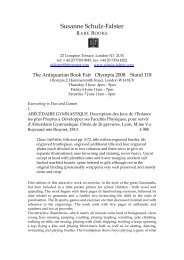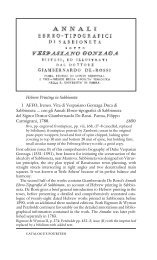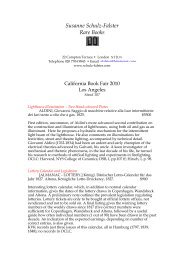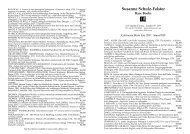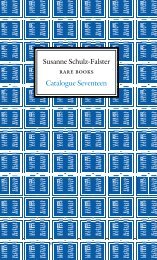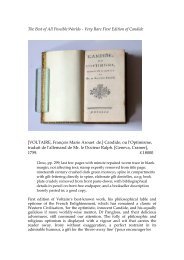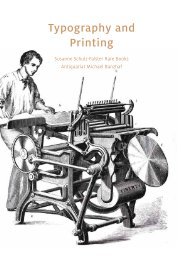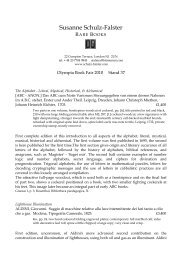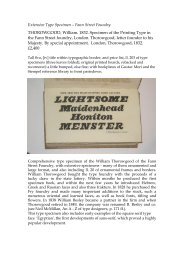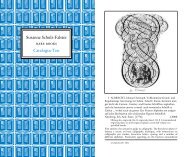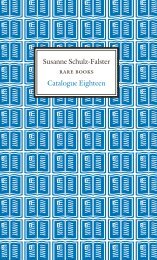Catalogue Number 12 - Susanne Schulz-Falster
Catalogue Number 12 - Susanne Schulz-Falster
Catalogue Number 12 - Susanne Schulz-Falster
Create successful ePaper yourself
Turn your PDF publications into a flip-book with our unique Google optimized e-Paper software.
First edition of this attractive and well-illustrated comprehensive printing<br />
manual. Vinçard, describing himself as a ‘typographiste’, describes in detail<br />
the whole process of printing, beginning with type-founding, the design,<br />
production and use of type, diVerent type faces and their uses, accentuation<br />
in French and other languages, before proceeding to composition and<br />
presswork. Interestingly he proposes the use of ligatures for pronouns. He<br />
includes a printing vocabulary, and numerous type specimen.<br />
The second half of the books deals with the practical printing process,<br />
and also includes information on the selection of papers and ink. Rather<br />
attractively he includes eight full-page examples of printing on coloured<br />
stock, and also Wve examples of printing with coloured inks. Vinçard concludes<br />
with a chapter on printing and the law, giving details of licensing<br />
agreements and copyright provisions etc.<br />
Overall a detailed and very attractively produced printing manual. The<br />
engraved frontispiece shows a wooden printings press and a view of a typesetters<br />
oYce.<br />
Bigmore & Wyman praise the manual as well written and of interest for<br />
being one of the few old manuals to deal with paper. A second edition,<br />
which includes far fewer specimen pages than the Wrst edition, was published<br />
in 1823.<br />
G. Barber, p. 16; Bigmore & Wyman III 51; Gaskell, Barber & Warrilow F8;<br />
JPHS, F8; Jackson Burke 990.<br />
Humanist Reform of Poor Relief<br />
91 VIVES, Juan Luis. Tratado del Socorro de los Pobres<br />
compuesto in Latin ... traducido en Castellano por el Dr. Juan de<br />
Gonzalo. Valencia, Imprenta de Benito Monfort, 1781. £800<br />
8vo, pp. [iv], xxxiv, vi, 250; portrait title vignette; very clean and crisp;<br />
contemporary full marbled sheep, spine decoratively gilt, with giltlettered<br />
spine label; single worm hole to lower joint, some light<br />
scuYng; a Wne copy.<br />
A Wne copy of the Wrst Spanish translation of Vives’ humanist tract on the<br />
reform of poor relief. De subventione pauperum, written in 1524 and Wrst<br />
susanne schulz-falster rare books catalogue twelve<br />
published in 1526. Vives is an important exponent of revised thinking on<br />
poor relief in Western Europe. He describes the evils which poverty engenders<br />
and outlines norms of politico-social action to alleviate its symptoms.<br />
‘In this tractate, addressed to the magistrates of Bruges, who had consulted<br />
him on the subject, he proposed a complete reform of the existing<br />
methods of poor relief. The destitute should be properly registered and<br />
classiWed; those unable to work should be provided for in well-administered<br />
hospitals and almshouses; those able to work should be found employment;<br />
and mendicancy should be prohibited.’ (Palgrave III, p. 631). Vives stressed<br />
the importance of teaching all a trade, and the need to supply them with<br />
work led him to propose the foundation of municipal workshops. He also<br />
insisted that artisans should admit into their workshops certain workers<br />
designated by the public authorities, thus undermining guild independence.<br />
His treatise can be seen as the Wrst practical proposal for municipal welfare,<br />
insisting that the concept of health care for all its people was the principal<br />
function of the state.<br />
The Spanish humanist Juan Luis Vives (1492–1540), was professor at<br />
the universities of Louvain and Oxford. Considerably younger than Erasmus<br />
he nevertheless was closely associated with him, and connected and<br />
holds an important position among the humanists. He is considered the<br />
predecessor of Bacon in that that he based his thought in experience, used<br />
the methods of the natural sciences and upheld the method of induction.<br />
Palay y Dulcet 371641; see Garnier 46 for Latin edition (1532).<br />
92 VOLTAIRE, François Marie Arouet de. Della Pace Perpetua,<br />
Operetta di Voltaire con Annotazioni. Milano, RaVaele Netti, Anno<br />
VI Rep. [1797/1798]. £480<br />
8vo, pp. viii, 91; some light spotting; slightly later blue paste-paper<br />
boards.<br />
First edition in Italian of Voltaire’s De la Paix Perpétuelle, par le Docteur<br />
Goodheart, originally published in 1769 in Geneva, but immediately put on<br />
the index. In his outspoken critique of the universal peace project of the<br />
Abbé de Saint-Pierre, Voltaire maintains that fanaticism and especially religious<br />
intolerance are the cause and foundation of all wars. He is sceptical<br />
about its eVectiveness, and appeals for tolerance to repair the damage of<br />
‘intolérance chrétien’.<br />
His anti-clerical stance was apparently welcomed by the lawmakers of the<br />
Xedgling Italian republic, which accounts for the translation of the work in<br />
the late 1790s. Extensive annotations by the translator emphasise this point.<br />
There was another Italian edition the following year.<br />
In this copy Voltaire’s work is bound together with a 1773 edition of<br />
Voltaire’s Zaire.<br />
Uncommon, not found in OCLC or RLIN; for French edition see Bengesco 1784,<br />
van den Dungen p. 71; see H. Meyer, Voltaire on war and peace, Voltaire Foundation,<br />
1976.



